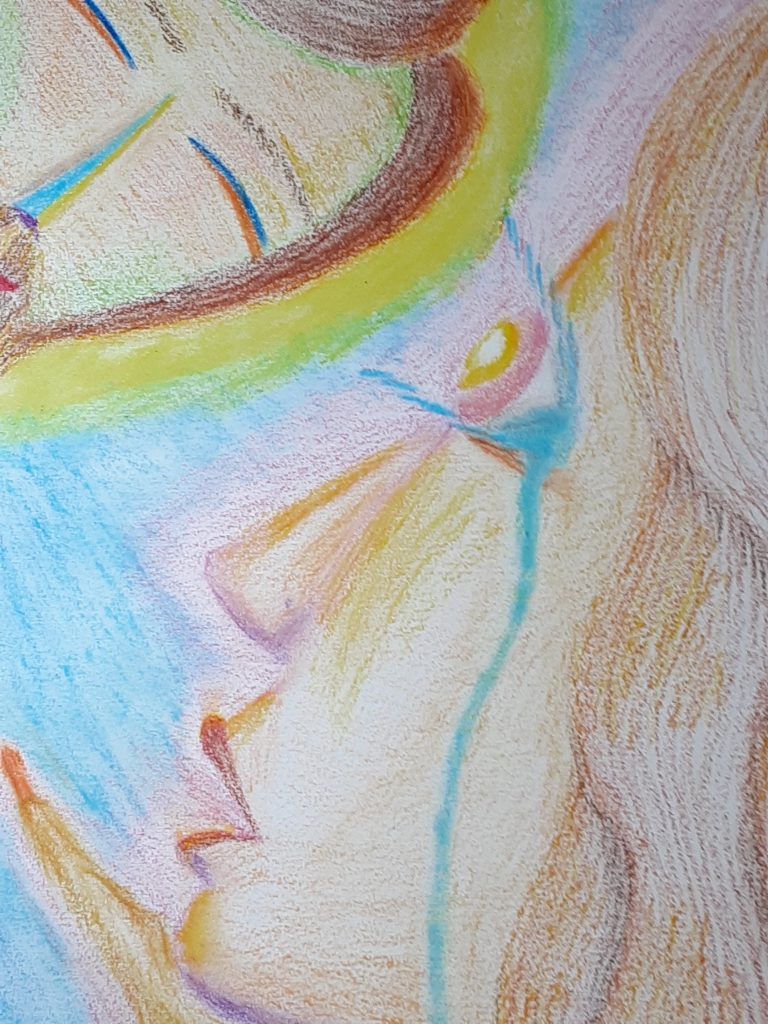“Me mou haptou” (Stop clinging on to me, John 20: 17), Stage 2
Wax pastel (crayon) on paper
“Me mou haptou” (私にしがみつくのは、やめようよ、ヨハネ20: 17)、ステージ2
紙にワックスパステル(クレヨン)
(日本語は、英語の下に)
So, what does this “Stop clinging on to me” have to do with “, for I have yet to ascend
to my Father”, in the inspiration to this painting, John 20: 17 ???
Enigmatic — honestly, I’ve never seen any commentary that explains this connection between the two phrases in a way clear and convincing.
So, let’s see it from a very plain and simple perspective: what is the possible
relationship between “someone holding on to you” and “you ascending” ??
Obviously, you cannot ascend while that someone is clinging on to you!!
But then,
+ why was Mary clinging on to Jesus, first of all??
— Just imagine you witnessed the execution of someone you loved, who
without doubt died. Then, on the third day, that someone has appeared to you
and spoken to you, just as he/she predicted. What would be your response??
Without the prediction, you would probably consider you are seeing thing.
Yet with the prediction in advance, and if what you are seeing is so real and
clear, you could be overjoyed and hold on to the “risen one”.
+ if it was “ascension hindering” for Mary to cling on to Jesus,
why didn’t he just stay away from her or say “Noli me tangere” instead??
— That would have been so stern, stark, and cold-blooded!
Jesus knew how troubled Mary was after the Crucifixion, so naturally
He wanted to revive her life and faith. Thus He spoke to and appeared to her
after the Resurrection. Shocked and overjoyed, Mary held on to Him.
If you were in His boots, in a case like this, would you just utter
cold-blooded “Don’t touch me!” ??
Also, keep in mind that our Savior has some good sense of humor as well.
Most of the existing exegeses ignore the thing called “humor” — which is
also missing in much of Christian theologies.
So, if I am allowed to provide an amplified version of the two phrases in question
here:
“Ha, ha, hey, Mary, stop clinging on to me! I cannot ascend to my Father while
you clinging on to me!” — humorous, isn’t it?
I take John 20: 17 seeing good, loving and caring humor in Jesus, and
this painting stands on that “take”.
じゃ、ここでの「私にしがみつくのは、やめようよ」と「私はまだ、父のもとに
昇っていないんだからね」と、何の関係があるのでしょうか?そこが、
この絵画のそもそものインスピレーションなのですが。
実に謎ですよね。なにせ、この結びつきを明確に、納得できるよう解説
している釈義を、私は見たことがありません。
そこで、きわめて単純明快な視点でこの問題を見てみましょう。
「しがみつくの、やめてよ」と「昇天」との間に、そもそもどんな関係が
あり得るのか??
いうまでもなく、誰かがあなたにしがみついていたら、昇天するわけに
いきませんよね!?
でもそうすると:
+ そもそも、マリアがイエスにしがみついていたのは、なぜか?
— 想像してみてください。あなたが愛する誰かが処刑される現場を目の
当たりにし、その愛する人が確かに死んだとしたら? それから3日目、
その愛する人が予めおっしゃっていた通り、あなたに語り掛け、
姿を現し、しかもそれが あまりにも現実的で明白であったとしたら?
あなたなら、どんな反応をしますか?
予めの言葉がなければ、幻を見ているのだと考えるかも。
でもあらかじめ、その人は自分が復活すると仰っていました。
そして今ここに、明白におられるとしたら?歓喜のあまり、
復活した方に抱き着いても、不思議ではないですよね。
+ マリアがイエスにしがみついては「昇天の妨害」になるのなら、
マリアから距離を置くか、単純に “Noli me tangere” (我に触るな)と
いえば済むことじゃ?
— そうした対応は、まじめに過ぎ無感情で冷酷なものです。
十字架処刑の後でマリアがどれだけ心を乱していたか、イエスはご存じ
だったはずです。当然イエスは、マリアの信仰と生き方とをリヴァイヴ
させようと されたはずですね。
ですから、復活後にイエスはマリアに話しかけ、姿を現されました。
驚きと歓喜のあまり、マリアがイエスにしがみついたのも、無理は
ありません。
あなたがイエスだったとしたら。こういう場合、冷たく「我に触るな」と
言い放ちますか??
それと、そもそも私たちの救い主にはユーモアのセンスもあることを、
忘れないようにしましょうよ。既存の釈義ではこの「ユーモア」という
視点が欠落していますし、キリスト教神学の多くでもユーモアは無視されて
ますよね。
そんなわけで、もし私がここで「かなりパラフレーズした」この2フレーズの
日本語翻訳を提示してよいなら、私ならこうします:
「ははは、マリア、そんなにしがみつくのは、やめてよ!しがみついてたら、
父のところに昇っていけないじゃないか」 ・・・ ユーモアですね。
私はヨハネ20:17を上述のように理解しており、この絵画もその理解に
基づいております。

